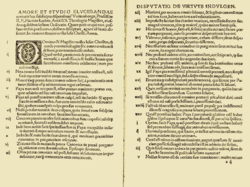
Back Johann von Wesel German Johann von Wesel Esperanto Johann Ruchrat von Wesel Finnish Johann Ruchrat von Wesel ID
| Part of a series on the |
| Reformation |
|---|
 |
| Protestantism |
Johann Ruchrat von Wesel (died 1481) was a German Scholastic theologian. He objected to the system of indulgences,[1] and has been called a "reformer before the Reformation".[2]
He was born at Oberwesel early in the 15th century. He appears to have been one of the leaders of the humanist movement in Germany, and to have had some intercourse and sympathy with the leaders of the Hussites in Bohemia.[2]
Erfurt was in his day the headquarters of a humanism which was both devout and opposed to the realist metaphysics and the Thomist theology which prevailed in the universities of Cologne and Heidelberg. Wesel was one of the professors at Erfurt between 1445 and 1456, and was vice-rector in 1458. In 1460 he was appointed preacher at Mainz, in 1462 at Worms, and in 1479, when an old and worn-out man, he was brought before the Dominican inquisitor Gerhard Elten of Cologne. The charges brought against him took a theological turn, though they were probably prompted by dislike of his philosophical views. They were chiefly based on a treatise, De indulgentiis, which he had composed while at Erfurt twenty-five years before. He had also written De potestate ecclesiastica. He died under sentence of imprisonment for life in the Augustinian convent in Mainz in 1481.[2]